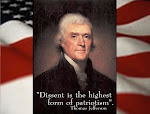Tuesday, July 04, 2006
4TH OF JULY
Independence?
Five signers were captured by the British as traitors, and tortured before they died.
Twelve had their homes ransacked and burned.
Two lost their sons serving in the Revolutionary Army; another had two sons captured.
Nine of the 56 fought and died from wounds or hardships of the Revolutionary War.
They signed and they pledged their lives, their fortunes, and their sacred honor.
What kind of men were they?
Twenty-four were lawyers and jurists. Eleven were merchants, nine were farmers and large plantation owners; men of means, well educated, but they signed the Declaration of Independence knowing full well that the penalty would be death if they were captured.
Carter Braxton of Virginia, a wealthy planter and trader, saw his Ships swept from the seas by the British Navy. He sold his home and properties to pay his debts, and died in rags.
Thomas McKeam was so hounded by the British that he was forced to move his family almost constantly. He served in the Congress without pay, and his family was kept in hiding. His possessions were taken from him, and poverty was his reward.
Vandals or soldiers looted the properties of Dillery, Hall, Clymer, Walton,Gwinnett, Heyward, Ruttledge, and Middleton.
At the battle of Yorktown, Thomas Nelson, Jr., noted that the British General Cornwallis had taken over the Nelson home for his headquarters.
He quietly urged General George Washington to open fire. The home was destroyed, and Nelson died bankrupt.
Francis Lewis had his home and properties destroyed. The enemy jailed his wife, and she died within a few months.
John Hart was driven from his wife's bedside as she was dying. Their 13 children fled for their lives. His fields and his gristmill were laid to waste. For more than a year he lived in forests and caves, returning home to find his wife dead and his children vanished. Some of us take these liberties so much for granted, but we shouldn't.
So, take a few minutes while enjoying your 4th of July holiday and silently thank these patriots. It's not much to ask for the price they paid.
Remember: freedom is never free!
I hope you will show your support by sending this to as many people as you can, please. It's time we get the word out that patriotism is NOT a sin, and the Fourth of July has more to it than beer, picnics, and baseball.
2 from William Rivers Pitt
4th of July...............................PEACE...................................Scott
William Rivers Pitt | When I Paint My Masterpiece
http://www.truthout.org/docs_2006/070206A.shtml
"America was about a lot of things, back when it all meant something, but there
was always a virus in the matrix," writes William Rivers Pitt. "George
Washington and Thomas Jefferson and the rest of the great thinkers put all the
good ideas to paper, but they also made sure the thing was hard-wired to favor
anyone with a lot of money."
FOCUS | William Rivers Pitt: The Example
http://www.truthout.org/docs_2006/070406Z.shtml
"Lionizing a Founding Father on the Fourth of July is a simple task, to be sure,
but Benjamin Franklin turns this process on its ear. He represents all we can be
and all we should be, and likewise represents all we no longer seem to be or
care to be today. He is worthy of admiration, which is easy, and worthy of
emulation, which is not," writes William Rivers Pitt.
A Soldier's Story
Combat can change a life in a second. The snap of a sniper's bullet or the blast
of a bomb will instantly end it or turn a healthy body into a maimed wreck. But
for US marine James Blake Miller what changed his life was the sudden shutter
click of a war photographer's camera.
Can't Win the War? Bomb the Press!
The New York Times
Sunday 02 July 2006
Old Glory lost today," Bill Frist declaimed last week when his second attempt to rewrite the Constitution in a single month went the way of his happy prognosis for Terri Schiavo. Of course it isn't Old Glory that lost when the flag-burning amendment flamed out. The flag always survives the politicians who wrap themselves in it. What really provoked Mr. Frist's crocodile tears was the foiling of yet another ruse to distract Americans from the wreckage in Iraq. He and his party, eager to change the subject in an election year, just can't let go of their scapegoat strategy. It's illegal Hispanic immigrants, gay couples seeking marital rights, cut-and-run Democrats and rampaging flag burners who have betrayed America's values, not those who bungled a war.
No sooner were the flag burners hustled offstage than a new traitor was unveiled for the Fourth: the press. Public enemy No. 1 is The New York Times, which was accused of a "disgraceful" compromise of national security (by President Bush) and treason (by Representative Peter King of New York and the Coulter amen chorus). The Times's offense was to publish a front-page article about a comprehensive American effort to track terrorists with the aid of a Belgian consortium, Swift, which serves as a clearinghouse for some 7,800 financial institutions in 200 countries.
It was a solid piece of journalism. But if you want to learn the truly dirty secrets of how our government prosecutes this war, the story of how it vilified The Times is more damning than anything in the article that caused the uproar.
The history of that scapegoating begins on the Friday morning, June 23, that The Times, The Los Angeles Times and The Wall Street Journal all published accounts of the Swift program first posted on the Web the night before. In his press briefing that morning, Tony Snow fielded many questions about the program's legality. But revealingly, for all his opportunities, he never attacked the news media.
Far from Swift-boating the Swift reportage, he offered tentative praise. "It's interesting," he said, "because I think there's a fair amount of balance in the story in that you do have concrete benefits and you do have the kind of abstract harms that were mentioned in there." He noted that there had been "no allegation of illegality" in the Times article.
This was accurate. The story was balanced, just as Mr. Snow said. And it was no cause for a national-security alarm for the simple reason that since 9/11, our government has repeatedly advertised that it is following the terrorists' money trail, a tactic enhanced by the broad new powers over financial institutions that Mr. Bush sought and received. In November 2002, he and the Treasury secretary at the time, Paul O'Neill, even held a televised event promoting their Foreign Terrorist Asset Tracking Center, established expressly, in the president's words, to "investigate the financial infrastructure of the international terrorist networks." As for Swift, Dan Froomkin of washingtonpost.com points out that it can't resist bragging on its own Web site that it "has a history of cooperating in good faith with authorities," including treasury departments and law enforcement agencies, in trying "to combat abuse of the financial system for illegal activities."
Only a terrorist who couldn't shoot straight would assume that Swift was not part of the American effort to stalk terrorist transactions; that's tantamount to assuming that cops would track down license plate numbers without enlisting the Department of Motor Vehicles. But, unfortunately for us, terrorists are not so stupid: it's been reported as far back as 2003 (in The Washington Post) and as recently as this month (in Ron Suskind's must-read best seller, "The One Percent Doctrine") that our enemies long ago took Mr. Bush at his word and abandoned banks for couriers, money brokers, front companies and suitcases stuffed with cash and gold. Tom Brokaw summarized the consensus of terrorism experts last week when he told Chris Matthews of MSNBC: "I don't know anyone who believes that the terrorist network said, 'Oh my God, they're tracing our financial transactions? What a surprise.' Of course, they knew that they were doing that."
The real news conveyed by The Times and its competitors was not the huge program to track terrorist finances, but that per usual from the administration that gave us Gitmo, the program was conducted with little oversight from the other two branches of government. Even so, the reporting on the pros and cons of that approach was, as Mr. Snow said, balanced.
Or so he said Friday morning, June 23. By Monday, the president had entered the fray and Mr. Snow was accusing The Times of putting the "public's right to know" over "somebody's right to live." What had happened over the weekend to prompt this escalation of hysteria? The same stuff that always happens when the White House scapegoats the press (or anyone else): bad and embarrassing news that the White House wants to drown out.
One such looming embarrassment was that breathless arrest in Miami of what federal authorities billed as a "homegrown terrorist cell." This amazing feat of derring-do had all the melodramatic trappings of a carefully staged administration P.R. extravaganza. On June 22, the F.B.I. director, Robert Mueller, just happened to be on "Larry King Live" speaking about his concerns about "homegrown terrorists" when, by a remarkable coincidence, Larry King announced a "report just in" from a Miami station on a federal terrorism investigation. The next day - the same day the Swift story was published - brought the full-dress dog-and-pony show by the intrepid attorney general, Alberto Gonzales.
But rain soon started to fall on this parade. The seven men accused of plotting to take down the Sears Tower in Chicago and collaborate with Al Qaeda on a "full ground war" turned out to have neither weapons nor explosives nor links to Al Qaeda; both the F.B.I. and the Chicago police said there was no operational threat. By Saturday the administration's overhyped victory against terrorists was already deflating into a national punch line, a nostalgic remembrance of John Ashcroft orange terror alerts past.
Sunday brought another unwanted revelation (from Michael R. Gordon of The Times): Gen. George Casey Jr., the commander in Iraq, was drafting a plan for sharp troop reductions there, some of them to precede this year's election. Inconveniently enough, the Casey approach was a virtual double for the phased withdrawals advocated by Senate Democrats days earlier and incessantly slurred as "cut-and-run" defeatism by Republicans.
By the time of the Bush-Snow eruption on Monday, the Democrats were holding hearings on the Hill about prewar intelligence. It was better that Americans hear tirades about traitors in the press than be tempted to listen to the testimony of Lawrence Wilkerson, Colin Powell's former chief of staff, who described Mr. Powell's February 2003 United Nations presentation on Iraq's W.M.D. as "the perpetuation of a hoax."
It's not only the White House that has a vested political interest in concocting a smoke screen by demonizing the fourth estate as a fifth column. The Democrats were holding their hearing because Pat Roberts, the chairman of the Senate intelligence committee, has for two years been stalling his panel's promised investigation into how the administration used intelligence before the war. Hoping that we'd forget about that continuing cover-up, Mr. Roberts last week made a big show of calling for an investigation into the Swift story's supposed damage to national security.
Representative King, so eager to label others treasonous, has humiliating headlines of his own to counteract: he's the chairman of the House Homeland Security Committee who has so little clout and bureaucratic aptitude that he couldn't stop the government led by his own party from stripping New York City, in his home state, of 40 percent of its counterterrorism funding. If there's another terrorist attack, he may be the last person in New York who should accuse others, as he did The Times on the House floor on Thursday, of having blood "on their hands."
Such ravings make it hard not to think of the official assault on The Times and The Washington Post over the Pentagon Papers. In 1972, on the first anniversary of the publication of that classified Pentagon history of the Vietnam War, The Times's managing editor then, A. M. Rosenthal, reminisced in print about the hyperbolic predictions that had been made by the Nixon White House and its supporters: "Codes would be broken. Military security endangered. Foreign governments would be afraid to deal with us. There would be nothing secret left." None of that happened. What did happen was that Americans learned "how secrecy had become a way of life" for a government whose clandestine policy decisions had fomented a disaster.
The assault on a free press during our own wartime should be recognized for what it is: another desperate ploy by officials trying to hide their own lethal mistakes in the shadows. It's the antithesis of everything we celebrate with the blazing lights of Independence Day.
FURTHERMORE. . .
with more than three times as many viewers as the World Cup and almost
three times as many as the World Series,25% of Americans don't watch any
championship at all. They still get to pay for the stadiums, though.
http://www.rasmussenreports.com/2006/June%20Dailies/soccer.htm
PSYCHOLOGISTS FOR SOCIAL RESPONSIBILITY has called for the closure of
the U.S. prison at Guantanamo Bay and any other U.S. prisons where
prisoners are incarcerated beyond the bounds of international human
rights law. Says the group: "Unfortunately, we have a number of
references from reputable sources, including Pentagon officials, to the
involvement of psychologists in these procedures, particularly as part
of the so-called Behavioral Science Consulting Teams. . .We applauded
when the American Psychological Association made it clear that
"Psychologists may never engage in, facilitate, or countenance torture
or other cruel, inhuman, or degrading treatment." We were therefore most
distressed to see that the military is planning to "use only
psychologists to help interrogators devise strategies to get information
from detainees
http://www.psysr.org
AL KAMEN, WASHINGTON POST - White House press secretary Tony Snow , on
CNN's "Late Edition" on Sunday, said: "The president understands
peoples' impatience -- not impatience, but how a war can wear on a
nation. He understands that. If somebody had taken a poll in the Battle
of the Bulge, I dare say people would have said, 'Wow, my goodness, what
are we doing here?' But you cannot conduct a war based on polls." In
fact, there was a poll taken by Gallup from Dec. 31, 1944, to Jan. 4,
1945 -- three years into that war and right in the middle of the bloody
Battle of the Bulge, where U.S. casualties were estimated between 70,000
and 80,000. It found that 73 percent of Americans would refuse to make
peace with Adolf Hitler if he offered it and that 86 percent of
Americans thought there was no chance that we would lose the war in
Europe.
http://www.washingtonpost.com/wp-dyn/content/article/2006/06/22/
AR2006062201589.html?nav=rss_opinion/columns
NY TIMES - When a publisher starts talking about a book as "an
experience that transcends the book itself," you know that what matters
isn't going to be the writing. What matters is the synergy, as they used
to call it in the good old AOL Time Warner days. The book in question is
"Cathy's Book," a novel for adolescent girls featuring a heroine who
gives tips on makeup while the story unfolds. As it happens, the makeup
she uses is by Cover Girl, which, in return for product placement, has
agreed to feature the novel prominently on a Web site it runs for girls
of the very age group likely to buy "Cathy's Book." If nothing else,
this deal is a reminder that writers will nearly always take publicity
if they can't get cash.
http://www.commercialalert.org/news/archive/2006/06/the-art-of-the-deal
AIR FORCE TO SPEND NEARLY A HALF MILLION BUCKS TO LEARN ABOUT BLOGS
WILLIAM J. SHARP, AIR FORCE OFFICE OF SCIENTIFIC RESEARCH - The Air
Force Office of Scientific Research recently began funding a new
research area that includes a study of blogs. Blog research may provide
information analysts and warfighters with invaluable help in fighting
the war on terrorism. Dr. Brian E. Ulicny, senior scientist, and Dr.
Mieczyslaw M. Kokar, president, Versatile Information Systems Inc.,
Framingham, Mass., will receive approximately $450,000 in funding for
the 3-year project entitled "Automated Ontologically-Based Link Analysis
of International Web Logs for the Timely Discovery of Relevant and
Credible Information."
"It can be challenging for information analysts to tell what's important
in blogs unless you analyze patterns," Ulicny said. . . Patterns include
the content of the blogs as well as what hyperlinks are contained within
the blog.
Within blogs, hyperlinks act like reference citations in research papers
thereby allowing someone to discover the most important events bloggers
are writing about in just the same way that one can discover the most
important papers in a field by finding which ones are the most cited in
research papers. This type of analysis can help information analysts'
searches be as productive as possible.
http://www.defenselink.mil/transformation/articles/2006-06/ta062906b.html
STATES INCREASE PUBLIC HEALTH INSURANCE
http://www.latimes.com/news/nationworld/nation/la-na-insure25jun25,
1,1601931.story?track=rss
PAUL KRASSNER: GETTING HIGH DOWN UNDER
http://www.huffingtonpost.com/paul-krassner/getting-high-down-under_b_22747.html
MUSICAL GROUPS THAT WERE BANNED IN THE SOVIET UNION
http://news.scotsman.com/entertainment.cfm?id=928272006
TWO WASHINGTON INSIDERS SWITCH SIDES ON NORTH KOREA
http://www.washingtonpost.com/wp-dyn/content/article/2006/06/25/
AR2006062500640.html?nav=rss_opinion/columns
ATTACK OF THE STARLINGS
http://video.google.com/videoplay?docid=-6815781973393100875
ECOLOGY
ANDY MCSMITH, INDEPENDENT, UK - The low-energy light bulb and other
efficient lighting systems could prevent a cumulative total of 16
billion tons of carbon from being added to the world's atmosphere over
the next 25 years, according to a report by the International Energy
Agency.
The agency said it would not need any technology that is not already
widely available and - far from costing money - it would save more than
L1,300bn. The light used for homes and offices is a major cause of
climate change and also creates "light pollution", which means that city
children grow up never seeing the stars. . .
Artificial light accounts for almost one-fifth of the world's
electricity consumption, substantially more than the output of all the
nuclear power stations in the world. It generates around 1.9 billion
tons worth of carbon a year, equivalent to nearly three quarters of the
carbon coming from the exhaust of all the cars and light vehicles in the
world.
http://news.independent.co.uk/environment/article1155236.ece
CIVIL LIBERTIES
MICHAEL J. SNIFFEN, ASSOCIATED PRESS - Citizens, groups and corporations
are putting in fewer requests for information from the federal
government, but it's taking longer to get an answer and they get turned
down more often, a study reported Friday. In a study of 13 Cabinet
departments and nine agencies, the Coalition of Journalists for Open
Government found that the number of unprocessed requests rose from
104,225 at the end of fiscal 2004 to 148,603 at the end of fiscal 2005
on Sept. 30, 2005. Meantime, the number of requests that were processed
between 2004 and 2005 dropped from 522,817 to 477,937. As a result,
unprocessed requests rose from 20 percent of the total processed to 31
percent. Full or partial releases of the information requested declined
from 67 percent of all requests in 2004 to 63 percent in 2005. "This
study paints a very bleak picture for the Freedom of Information Act,"
said Rick Blum of the Sunshine in Government Initiative. "The law is
having a mid-life crisis at age 40."
STUDY
http://www.sunshineweek.org/files/cjogfoiarpt06.pdf
||||||||||||||||||||||||||||||||||||||||||||||||||||||||
VET ARRESTED FOR WEARING ANTI-WAR T-SHIRT AT VA HOSPITAL
MIKE FERNER, COUNTERPUNCH - Yesterday afternoon, drinking a cup of
coffee while sitting in the Jesse Brown V.A. Medical Center on Chicago's
south side, a Veterans Administration cop walked up to me and said, "OK,
you've had your 15 minutes, it's time to go."
"Huh?", I asked intelligently, not quite sure what he was talking about.
"You can't be in here protesting," Officer Adkins said, pointing to my
Veterans For Peace shirt.
"Well, I'm not protesting, I'm having a cup of coffee," I returned,
thinking that logic would convince Adkins to go back to his earlier
duties of guarding against serious terrorists.
Flipping his badge open, he said, "No, not with that shirt. You're
protesting and you have to go."
Beginning to get his drift, I said firmly, "Not before I finish my
coffee."
He insisted that I leave, but still not quite believing my ears, I tried
one more approach to reason.
"Hey, listen. I'm a veteran. This is a V.A. facility. I'm sitting here
not talking to anybody, having a cup of coffee. I'm not protesting and
you can't kick me out."
"You'll either go or we'll arrest you," Adkins threatened.
"Well, you'll just have to arrest me," I said, wondering what strange
land I was now living in.
You know the rest. Handcuffed, led away to the facility's security
office past people with surprised looks on their faces, read my rights,
searched, and written up. . .
http://www.counterpunch.org/ferner07012006.html
||||||||||||||||||||||||||||||||||||||||||||||||||||||||
POLITICS
DAVID AMMONS, AP - Sen. Maria Cantwell, a true-blue Democrat, [sic] is
trying to tamp down unrest among those on Washington state's political
left who are furious with her unapologetic support for the Iraq War. In
a state that has shown no affection for Republicans in more than two
decades of presidential elections, Cantwell would seem to have an easy
time securing a second term amid President Bush's sagging approval
ratings and discontent with the GOP-controlled Congress. . . But
Cantwell is facing fierce opposition from anti-war activists who
ordinarily would back her. Chants of "No More War" rang out before her
speech at last month's state party convention, protesters unfurled a
banner reading, "Maria Can't Say No to War" at another event, and
demonstrators squatted in her Seattle office. Even an appearance with
popular Sen. Barack Obama, D-Ill., in heavily Democratic Seattle
elicited boos for Cantwell. . .
http://news.yahoo.com/s/ap/20060703/ap_on_el_se/washington_senate
ARTS
DAN AQUILANTE, NY POST - The record industry is all shook up. On a slide
since 1999 (the year of Backstreet, Britney, Ricky Martin and Shania)
labels are down another 3.4 percent, to 281 millions units in the first
half of 2006. . . The number of downloads more than doubled this year -
to 13 million units - but the digital trade accounts for just 4.5
percent of the market. . . Cassette music sales fell a whopping 54
percent in the first half of 2006
http://www.nypost.com/entertainment/music_rocks__but_whos_listening_
entertainment_dan_aquilante.htm
||||||||||||||||||||||||||||||||||||||||||||||||||||||||
WHY CD SALES ARE DROPPING
READER M OFFERS this comment on the drop in CD sales: "
||| Because too many of us have taken the pledge, and will not buy any
item when a royalty will be paid to an RIAA or MPAA member. Do without,
rather than provide funds for the entertainment industry to continue to
purchase rights stealing legislation. If you must have music or movies
from one of these wretched outfits, then buy it used.
- Because too many of us realize that the prices on CDs are grossly
inflated. A whole two hour movie DVD usually costs less than a CD of its
soundtrack. What sense does that make?
- Because too many of us have decided that the movies and music that is
being produced today, is generally of very low quality. Not worth the
time to sit through, unless someone pays us for the time and the
boredom.
- Because we don't want the entertainment industry to install spyware
and malware that will wreck our PCs, and secretly report information
about us to the industry. |||
A Stand in the Forest
The Los Angeles Times
Sunday 02 July 2006
For 30 years the Dehcho Indians have resisted a planned natural gas pipeline through one of North America's last great wilderness areas in an effort to preserve their land and way of life.
Fort Simpson, Canada - After the ice broke up and the ferry began running on the Liard River, two rangy Indians with weathered faces and easy gaits shouldered a sack of beaver and muskrat pelts for the spring fur auction and took a rifle for bear protection.
On their short hike through the woods to the ferry landing, Jonas and Roy Mouse paused as they often do, heads bowed and caps in hand, at a rosary-draped cross that marks the spot where their aged mother collapsed and died several years ago. The cross stands alongside an oil pipeline that was dug through their forested homeland and that the brothers say for eight years drove away animals that they hunt and trap for a living.
Today, the middle-aged brothers, members of the Dehcho First Nations, are facing another encroachment on their aboriginal way of life: an even bigger, 800-mile-long natural gas pipeline that would bisect the tribe's traditional territory and help spawn industrial development in Canada's vast boreal forest, one of the last intact stretches of the Earth's original forest cover.
For three decades, the Dehcho have been resisting the $7-billion project, which is backed by other native groups in the Northwest Territories. But the Dehcho are under mounting pressure to drop their opposition to a project that would serve North American energy markets as the United States strives to reduce dependence on the Middle East. Canada is already the largest foreign supplier of natural gas to the U.S.
The companies that want to build the pipeline - Imperial Oil, Shell Canada, ConocoPhillips and ExxonMobil Canada - estimate that it will carry 1.2 billion cubic feet of gas per day, which industry experts say is enough annually to heat more than 3 million homes for a year.
Recently, officials of Canada's newly elected Conservative government signaled their unwillingness to let the Dehcho stand in the way of the project, which proponents want to start building in 2008 and finish a few years later. Jim Prentice, minister of Indian affairs, declared that the pipeline, which still needs regulatory approval, would be built along the Mackenzie Valley with or without the tribe's blessing.
However, Prentice's remarks only stiffened resistance from the 4,500-member tribe, the largest native group along the pipeline and the only one with an unresolved claim to its traditional lands.
Grand Chief Herb Norwegian said that if the government tries to expropriate Dehcho land for pipeline construction, the tribe would retaliate with litigation and possibly blockades.
"People think of a pipeline like a garden hose in your yard," Norwegian said. "But a pipeline of this magnitude is like building a China Wall right down the valley, and the effects will be there forever and ever."
Many Dehcho fear that hundreds of trucks will disrupt their quiet communities, that construction camps will breed drug and alcohol abuse, and that the massive project will drive away caribou, moose and other wildlife that sustain people like the Mouse brothers.
In the long run, they fear the project will spur a wave of oil and gas prospecting that will bring more pipelines and roads and so many newcomers that the Dehcho could become a powerless minority in the land they have occupied for many centuries.
The pipeline would tap into 6 trillion cubic feet of natural gas in three well fields north of the Arctic Circle. It would move the gas south along the Mackenzie River to Alberta province, where it would be used to fuel a massive oil extraction project or sent directly to markets in Canada and the United States.
"It is a significant new supply source," said Imperial Oil spokesman Pius Rolheiser. One trillion cubic feet could serve all of Canada's gas-heated homes for a year, he said.
The project is expected to spur development of other natural resources in the Territories, an area that is almost three times larger than California but has only 42,000 inhabitants.
"You are going to get a lot of lateral pipelines built into the system," said Chris Theal, research director at Tristone Capital Inc., a worldwide energy investment bank.
But about 40% of the pipeline route crosses land claimed by the Dehcho, and before approving the project, they want a power-sharing agreement over 80,000 square miles of ancestral territory, allowing them to preserve lands for cultural or environmental reasons, to control industrial development and to collect royalties and taxes.
Dehcho leaders acknowledge that withholding support for such a significant project gives them leverage to secure unprecedented authority.
Government officials say their demands are unrealistic.
"It would give 4,500 people the power to govern an area about half the size of France," said Tim Christian, the chief federal negotiator. "And we certainly have not done that anywhere else [in Canada] and do not believe that is an appropriate model."
The government recently offered the Indians $104 million and ownership of about 18% of their traditional land, but Norwegian called it a "low-ball" offer.
Conservation groups are concerned about the pipeline's impact on one of the continent's great natural resources, Canada's 1.4-billion-acre boreal, or northern, forest. It is home to many of North America's land birds and big wild animals, and is a major storehouse of fresh water.
"What is extraordinary ... is you are opening one of the last great wildernesses of the world," said Stephen Hazell, a lawyer with the Sierra Club of Canada. "The oil and gas companies will want every last scrap of land for exploration."
The Canadian Boreal Initiative, a conservation organization, has been working with the government, industries and tribal groups to identify land that should be protected from development. But the organization's executive director, Cathy Wilkinson, said that only about 35 million of the Mackenzie Valley's more than 400 million acres of boreal forest have interim government protection. "The worry today is the pace of developing is outstripping the pace of protecting areas," she said.
Although the pipeline's right-of-way would be constructed during winter to minimize permafrost damage, scientists working for the energy companies acknowledged that it would increase the exposure of wildlife such as grizzly bears and woodland caribou to hunters or predators.
In addition to a 120-foot-wide pipeline right-of-way, the project calls for constructing staging areas, barge landings and camps for thousands of workers.
But scientists hired for the project contended that the disruptions would be short-term or limited to permanent facilities such as compressor stations.
"The ecosystem integrity ... will not be compromised," environmental consultant Petr Komers told a recent hearing. "Wide-ranging species will continue to move through the area and will continue to survive."
Lisanne Forand, assistant deputy minister for northern affairs, said construction "will go ahead only if the environmental assessment process indicates effects can be mitigated [and] if producers can make it economically viable."
Rolheiser, of Imperial Oil, which is the lead company, said whether the pipeline is built hinges partly on the cost of any government-required environmental mitigation and on the final tab for agreements with aboriginal groups. "It is an economically challenging project," he said.
In this frontier region, where tundra and timber lands unfold to the horizon, the economy already depends heavily on products that come out of the ground.
The diamond mining industry is one of the world's largest, but natural-gas development could eclipse it, according to Joe Handley, premier of the Territories. "This is a good time," he said. "The price is right. The demand is there."
Handley believes the pipeline will generate billions of dollars in royalties for Canadian governments, as well as spurring population growth, jobs, hydroelectric power and the first highway through the entire Mackenzie Valley.
Nonetheless, Handley said the project must balance development with protection of the environment and the traditional ways of life of the aboriginal people who constitute half the population.
Fort Simpson, where the Liard and the Mackenzie converge, was founded in the early 1800s as a fur trading post. Today, the town of 1,200 is home to hundreds of Dehcho. Like the rivers, their feelings about the pipeline run deep and wide.
"The land will be ruined," said 15-year-old Jacqueline Thompson. "The animals won't walk through it anymore."
"We were First Nations people before the government and made do with what we had.... So we are not too worried if the pipeline does not happen," said the grand chief's cousin, Keyna Norwegian, the local chief in Fort Simpson.
But the grand chief's brother, Bob Norwegian, is the community liaison for the Mackenzie pipeline project, and he believes it will encourage economic development and job training. "Folks are romanticizing about when we lived off the land," he said. "We are not going back to snowshoes and dog teams."
Last year, unemployment was 5.4% in the Territories - but twice that among aboriginal people. "The Dehcho is one of the have-not regions," said Kevin Menicoche, who represents six of the tribe's 10 communities in the legislative assembly. "There is no new money coming in."
The other tribes along the route have established an Aboriginal Pipeline Group and will acquire up to a third of the pipeline ownership. They have set a July 31 deadline for the Dehcho to join or risk losing many millions of dollars in gas profits, but the tribe has indicated that it would not decide by then.
"They are walking on pretty thin ice, because at the end of the day they could end up with no ownership in the pipeline and it could be built without any settlement of their land claim," said Fred Carmichael, chairman of the Aboriginal Pipeline Group.
But University of Victoria law professor John Borrows, an expert on aboriginal legal rights, said the Canadian Constitution, court rulings and treaties provide the Dehcho with strong protection against government expropriation of their traditional territory.
"If it went to court, it could be tied up 10 to 15 years," Borrows added.
The pipeline's impact could be greatest for people such as Steven Jose-Cli, who supplement their diet or income by hunting, fishing and trapping. One of about 30 Fort Simpson trappers, Cli works part time for the town's housing agency but prefers to be at his cabin 32 miles downriver, where he was raised.
Recently, Cli loaded an aluminum skiff for his first trip of the spring. Ice floes still drifted down the Mackenzie. A black bear rooted around a muddy bank, and a beaver cruised along before diving with a flip of its tail. In a biting wind, Cli swiftly lifted a shotgun and brought down two mallards as gifts for a neighbor.
"I don't want the pipeline to go through because it will destroy it all, and this is all I have," said Cli, who has little schooling and has been trapping since boyhood.
"They are going to make roads into my trapping area," he said.
Officials for the pipeline project said subsistence hunters and trappers will be compensated for relocation costs or any loss of game.
Addressing concerns that the project would aggravate substance abuse, they promised that workers would stay in drug- and alcohol-free camps.
Fort Simpson Mayor Duncan Canvin, a former Mountie who owns the town's only liquor store, said he wants business from pipeline workers to stimulate the stagnant economy. "Even an aging [person] with a coronary would like a pulse now and then," he said.
The last big pulse for Fort Simpson came in the mid-1980s when a pipeline company buried a 12-inch oil line along more than 500 miles of the Mackenzie Valley.
The line was built over the objections of the Dehcho, recalled Menicoche, the legislative representative here, who said the project provided some jobs but not much lasting economic benefit.
The proposed high-pressure gas line would run through largely undi?turbed areas parallel to the existing oil pipeline near here.
From a helicopter, the old right-of-way looks like a grassy roadway through an endless expanse of forest. It passes about 100 yards from the Mouses' cabin on the Liard.
Although the brothers take charging bears and subzero temperatures in stride, coping with the pipeline was a traumatic experience.
When the moose and beavers disappeared for seven or eight years, Roy, 59, said they had to move to a second cabin deeper in the woods.
If work on the new pipeline gets too close, the brothers said they will move to a third cabin. And if the game is scared off again, they will have to repeat the arduous task of cutting a new trap line. "We are going to be older and may not be able to hunt," said Jonas, 63. "But until we can't do it, we will be out there."
RFK Jr., Florida Law Firm to File Federal Whistleblower Suits Against Two Voting Machine Companies!
Monday 03 July 2006
First case to be filed next week, according to attorneys scheduled to meet with US Department of Justice officials this week.
Since Bobby Kennedy, Jr. and attorney Mike Papantonio have now discussed this out loud on the air on their Ring of Fire radio program (where yours truly will be a guest next Saturday, by the way) and since this week's Rolling Stone references it, we may as well share a few more prevoiusly undisclosed exclusive details about the upcoming federal qui tam (false claims or fraud) lawsuits to be filed against two of the major American electronic voting machine companies.
As previously reported, The BRAD BLOG can confirm that those two federal whistleblower suits will soon be filed by RFK Jr. and Papantonio. They will be filed via Papantonio's Florida-based firm Levin, Papantonio, Thomas, Mitchell, Echsner & Proctor, P.A.
The first of the two suits, The BRAD BLOG can now reveal, is scheduled to be filed late next week - around the 13th - according to the attorneys preparing the case. Representatives of the firm are scheduled to meet this week with officials at the U.S. Department of Justice to discuss some of the legal requirements of the first suit.
Because qui tam suits have very specific rules pertaining to public disclosure issues prior to filing, for the moment we can't say too much more about them, but regular BRAD BLOG readers will likely be familiar with some of the players involved in these suits.
Beyond that, we'll refer to Rolling Stone's coverage this week of Kennedy and Papantonio's plans - with more to come, no doubt, on these very pages in the days and weeks ahead …
Kennedy, meanwhile, is preparing to up the ante on those he believes abetted the GOP's electoral theft. In July, the outspoken attorney plans to file "whistle-blower" lawsuits against two leading manufacturers of electronic voting machines. According to Kennedy, company insiders are prepared to testify that the firms knowingly made false claims when they sold their voting systems to the government - misrepresenting the accuracy, reliability and security of machines that will be used by 72 million voters this November.
"This is a unique way to try and stop these vendors," Kennedy tells Rolling Stone. "In both cases, our whistle-blowers are familiar with security problems that were well known by the vendors but concealed from election officials during the bidding process. Because we're relying on 'inside' knowledge, it is a far more frightening prospect to the company than a traditional lawsuit might be. And if we prove our case, we will hit the corporations the only place they feel it: in their pocketbooks."
Gitmo Win Likely Cost Navy Lawyer His Career
The Seattle Post-Intelligencer
Saturday 01 July 2006
"Fearless" defense of detainee a stinging loss for Bush.
Lt. Cmdr. Charles Swift - the Navy lawyer who beat the president of the United States in a pivotal Supreme Court battle over trying alleged terrorists - figures he'll probably have to find a new job.
Of course, it's always risky to compare your boss to King George III.
Swift made the analogy to the court, saying President Bush had overstepped his authority when he bypassed Congress and set up illegal military tribunals to try Guantanamo detainees such as Swift's alleged al-Qaida client, Salim Ahmed Hamdan.
The justices agreed, ruling 5-3 Thursday in favor of dismantling the current tribunal system.
Despite his spectacular success, with the assistance of attorneys from the Seattle firm Perkins Coie, Swift thinks his military career is coming to an end. The 44-year-old Judge Advocate General officer, who was recently named one of the 100 most influential lawyers in the country by The National Law Journal, was passed over for promotion last year as the high-profile case was making headlines around the world.
"I may be one of the most influential lawyers in America," the Seattle University Law School graduate said, "but I won't be in the military much longer. That irony did strike me."
Swift's future in the Navy now rests with another promotion board that is expected to render its decision in the next couple of weeks. Under the military's system, officers need to be promoted at regularly scheduled intervals or their service careers are essentially over.
"The way it works, the die was cast some months ago," he said. "The decision has been made. I don't know what it is yet." But he thinks his chances are slim.
Asked if he believes he was passed over for promotion last year for political reasons, Swift would not speculate.
"I don't know," he said. "I'm not going to worry about it. I didn't volunteer for this. I got nominated for it. When I got it, I just decided to do the best I could."
Swift has worked under two officers as a member of the small team of lawyers defending "enemy combatants" being held at Guantanamo Bay. Both of them spoke highly of Swift Friday and said they gave him very high ratings on his annual review, called a fitness report.
"He's doing a fantastic job," said Swift's current boss at the Office of Military Commissions (tribunals), Marine Col. Dwight Sullivan.
Sullivan spoke of the crucial importance of the case decided Thursday by the Supreme Court. "It's a fundamental constitutional question about the powers of the president," Sullivan said. Asked about Swift's aggressive legal challenge of the commander in chief, Sullivan saluted Swift's "moral courage."
"He has been absolutely fearless is pursuing his client's interests. And also he has exhibited an extraordinary level of legal skill. His legal strategy has been brilliant.
"We all take an oath to protect and defend the Constitution of the United States and he has certainly done that, literally."
Swift spoke Friday about his "immense pride" in the military justice system. "I don't feel that because you join the military you should lose rights. If there is anyone who deserves the protection of those rights, it's the people who are willing to lay down their lives for it."
So the question is will Swift lay down his career because of his vigorous defense of a Yemeni tribesman who was Osama bin Laden's driver in Afghanistan.
Swift's first supervisor at the Office of Commissions was Col. Will Gunn, who said Friday that he gave Swift two annual fitness reports and "I gave him very high ratings overall."
Asked whether he thought politics might have played a role in Swift being bypassed for promotion, Gunn focused on Swift's atypical career as a military lawyer. "Charlie has spent a lot of time as a litigator, a trial advocate. That's really unusual in the JAG. You find that people in the more senior ranks have moved around and proved themselves in a variety of settings."
Most of Swift's career has been spent in the courtroom.
"While Charlie is a brilliant guy, a tenacious litigator, he does not have all the blocks checked like some other folks have," Gunn said. He called it a "breadth-of-experience" issue.
Swift clearly believes that his vigorous defense of Hamdan was, in a very real way, a vigorous defense of military justice and the Constitution.
"If they are calling the commissions (tribunals) military justice, it's got to live up to what military justice is. It means something. It's about the law, not what the leaders want. The greatest thing about the JAG Corps is ... I had the opportunity to work every day in a system I believe in."
Swift figures he'll hear around the second week of the month whether he's been passed over for promotion again. If so, he says, it will be time to dust off the resume.
He doesn't know what might be next, but when asked if he might move back to the Puget Sound area, he said: "I lived in Seattle for 6 1/2 years. I love Seattle."
He proceeded to reminisce fondly about sitting in the Kingdome's outfield bleachers watching the Mariners play. "And my wife is an airplane pilot. She could live anywhere."
FOCUS | Gideon Levy: A Black Flag
Gideon Levy writes, "A black flag hangs over the "rolling" operation in Gaza.
The more the operation "rolls," the darker the flag becomes. The "summer rains"
we are showering on Gaza are not only pointless, but are first and foremost
blatantly illegitimate. It is not legitimate to cut off 750,000 people from
electricity. It is not legitimate to call on 20,000 people to run from their
homes and turn their towns into ghost towns. It is not legitimate to penetrate
Syria's airspace. It is not legitimate to kidnap half a government and a quarter
of a parliament."
Tuesday's Daily Brief

National Journal: Bush Told Prosecutors He "Directed" Cheney To Discredit Joe Wilson...

From smh.com.au
Having already engulfed numerous high-ranking Bush administration officials, today the Valerie Plame CIA leak case produced perhaps its most damning expose. A National Review article by Murray Waas cites a number of sources with knowledge that President Bush told the special prosecutor, during a 2004 Oval Office interview, that he himself directed Vice President Dick Cheney to personally spearhead an effort to counter allegations made by former Ambassador Joseph C. Wilson IV.
According to sources, Bush told Cheney to disclose classified intelligence that would defend the administration and discredit Wilson. The President claimed he did not tell anyone specifically to expose the identity of CIA officer Valerie Plame, nor did he know that Cheney instructed his chief of staff to leak Plame's identity to the press. However, a source with direct knowledge of conversations between Bush and Cheney said that Bush told Cheney, regarding information that would discredit Wilson, to "get it out." Another person with knowledge of Bush's interview with the special prosecutor did not confirm the President's words, but said that the "get it out" account was consistent with what Bush told the prosecutor.
Click here to discuss it on HuffPost.
ON THE BLOG TODAY
Chris Durang: July 4th -- Now and in the '50s
John Kerry: How to Love Your Country
Jesse Kornbluth: I Salute the Flag. But I Pledge Allegiance to the Planet.
Corinne Marshall: A Fourth of July Carol

© 2006 HuffingtonPost.com, LLC. All rights reserved. | User Agreement | Privacy Policy
560 Broadway, Suite 308, NY, NY 10012
Cars and Its Attack on Progress

by Nick Snow, Mila Cobanov, and Claire Popovich
 As avid and loyal Pixar fans, we have seen such great animated movies as: Monsters, Inc., A Bug's Life, Toy Story, and The Incredibles. The beauty of these films lies is the fact that they are geared toward children but usually have an economic or moral lesson that adults (particularly libertarians) can appreciate.
As avid and loyal Pixar fans, we have seen such great animated movies as: Monsters, Inc., A Bug's Life, Toy Story, and The Incredibles. The beauty of these films lies is the fact that they are geared toward children but usually have an economic or moral lesson that adults (particularly libertarians) can appreciate.For example, in Monsters, Inc., the monsters live in a world powered by children's screams, a very scarce good. Through ingenuity the monsters discover they can power their world with a more abundant supply of children's laughter.
























